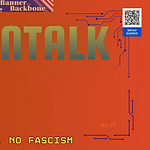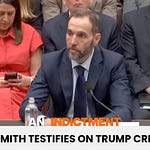The choreography was unmistakable. As Vladimir Zelensky arrived at the White House today—this time in a black suit rather than his military fatigues—the framework for Ukraine's surrender was already being written. Not by the victim of aggression, but by its architect and his American enabler.
Trump's arm around Zelensky, his declaration of love for the Ukrainian people—these gestures of warmth stood in stark contrast to their last confrontation in the Oval Office. But the warmth was conditional, transactional. The price had already been negotiated in Friday's summit between Trump and Putin, where the Russian president ran the show like he was the one in charge. Because, increasingly, he is.
The mechanics of this orchestrated surrender emerged clearly through Trump's rambling press conference. While he deflected with lies about mail-in ballots and praised himself for making Washington D.C. "safe," the real agenda crystallized: Ukraine must accept whatever "peace" Putin demands. The aggressor has become the arbiter, the invaded must now negotiate their own dismemberment.
Consider the perverse logic Trump deployed: "This isn't my war. This is Joe Biden's war." The president who launched an unprovoked invasion becomes blameless while the administration that supported a sovereign nation's defense becomes the villain. This isn't just historical revisionism—it's the complete inversion of aggressor and defender that characterizes every authoritarian narrative.
Zelensky's prepared statement revealed the desperate position he's been forced into. His emphasis on "reliable and lasting peace" and "security guarantees" tells us everything: Ukraine knows it's being asked to trade land for promises. The same promises that evaporated when Russia violated the Budapest Memorandum after Ukraine surrendered its nuclear weapons. History doesn't repeat, but it certainly rhymes—and the rhythm here is unmistakably ominous.
The European leaders present—Starmer, Macron, Merz, Meloni, and others—represent the last vestiges of resistance to this capitulation. But their leverage is limited when the American president is effectively negotiating on behalf of the Kremlin. Trump's promise of a phone call with Putin immediately after the meeting, his talk of a potential "trilateral" summit—these aren't the actions of a mediator. They're the movements of a messenger delivering terms.
What we're witnessing isn't peace-making but appeasement dressed in the language of pragmatism. The land along the Black Sea that Russia has seized through brutal aggression will likely be recognized as Russian territory. Ukraine will receive "security guarantees"—the same hollow promises that have failed before. And Putin will have achieved through Trump what he couldn't through military force alone: Western validation of his territorial conquest.
The most chilling moment came when Trump claimed that "if everything works out well today, we'll have a trilat. And I think there will be a reasonable chance of ending the war." Translation: if Ukraine accepts its dismemberment, if Europe acquiesces to this new world order where might makes right, then the killing might pause. Not end—pause. Because everyone knows, even if they won't say it, that Putin's appetite for empire won't be satisfied with this meal.
Trump's bizarre tangent about eliminating mail-in voting revealed more than his authoritarian instincts—it showed his complete alignment with Putin's worldview. Both men see democracy itself as the enemy, something to be manipulated, controlled, or eliminated when it doesn't serve their purposes. The connection between attacking voting rights at home and surrendering democracy abroad isn't coincidental; it's ideological.
The press pool, populated by friendly voices including what appeared to be Russian media operatives, lobbed softball questions while real journalism was sidelined. When asked directly about American peacekeepers, Trump's evasion spoke volumes. There will be no meaningful American commitment to Ukraine's future security—only the fig leaf of "support" that can be withdrawn the moment it becomes inconvenient.
The trilateral meeting Trump envisions won't be a negotiation—it will be a surrender ceremony. Putin will get his territorial gains recognized, Trump will claim he ended a war, and Zelensky will return to whatever remains of Ukraine to explain to his people why their sacrifice was betrayed by those who claimed to be their allies.
We are watching the post-World War II order collapse in real time, replaced by a world where nuclear-armed autocrats can simply take what they want while their assets in democratic governments facilitate the theft. The "lasting peace" Trump promises won't last beyond Putin's next territorial ambition. But by then, the precedent will be set: aggression works, democracy retreats, and the strong take what they will while the weak suffer what they must.
The tragedy isn't just Ukraine's—it's ours. Every democracy that allows this orchestrated surrender to proceed unopposed is signing its own future capitulation. Today it's Ukraine's territory. Tomorrow it might be Poland's, or the Baltics', or Taiwan's. The principle being established here—that military aggression can be rewarded with territorial gains if you have the right friends—will haunt the international order for generations.
But what choice does the West have? Plenty! They can enforce the sanctions regime that is ready for a vote in the Senate. They can continue to stand by the global standards of sovereignty that have kept the world safe for 80 years, and they could prevent a future war from engulfing the world.
Instead, we are witnessing an extortion committed against the Ukrainian people, orchestrated between Washington and Moscow, which will be disguised as peace. But make no mistake: this is conquest by other means, and we are all complicit in our silence.












